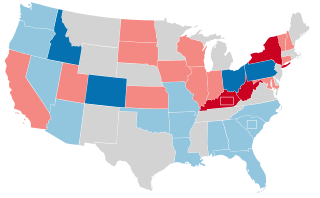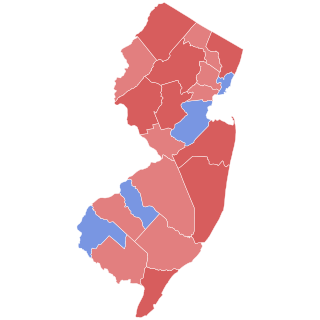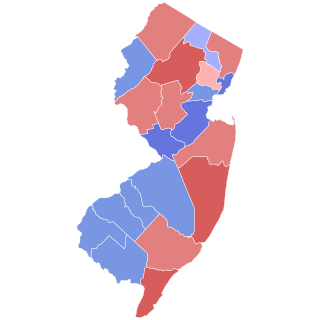
The 1962 United States Senate elections was an election for the United States Senate. Held on November 6, the 34 seats of Class 3 were contested in regular elections. Special elections were also held to fill vacancies. They occurred in the middle of President John F. Kennedy's term. His Democratic Party made a net gain of four seats from the Republicans, increasing their control of the Senate to 68–32. However, this was reduced to 67–33 between the election and the next Congress, as on November 18, 1962, Democrat Dennis Chávez, who was not up for election that year, died. He was replaced on November 30, 1962, by Republican appointee Edwin L. Mechem. Additionally, Democrat Strom Thurmond became a Republican in 1964, further reducing Democrats to 66–34. This was the first time since 1932 that Democrats gained seats in this class of Senators.

The 1958 United States Senate elections were elections for the United States Senate which occurred in the middle of President Dwight D. Eisenhower's second term. Thirty-two seats of Class 1 were contested in regular elections, the new state of Alaska held its first Senate elections for its Class 2 and 3 seats, and two special elections were held to fill vacancies.

The 1956 United States Senate elections were elections for the United States Senate that coincided with the re-election of President Dwight D. Eisenhower. The 32 seats of Class 3 were contested in regular elections, and three special elections were held to fill vacancies. Although Democrats gained two seats in regular elections, the Republicans gained two seats in special elections, leaving the party balance of the chamber unchanged.

The 1948 United States Senate elections were held concurrently with the election of Democratic President Harry S. Truman for a full term. The 32 seats of Class 2 were contested in regular elections, and one special election was held to fill a vacancy. Truman campaigned against an "obstructionist" Congress that had blocked many of his initiatives, and additionally, the U.S. economy recovered from the postwar recession of 1946–1947 by election day. Thus, Truman was rewarded with a Democratic gain of nine seats in the Senate, enough to give them control of the chamber. This was the last time until 2020 that Democrats flipped a chamber of Congress in a presidential election cycle.

The 1946 United States Senate elections were held November 5, 1946, in the middle of Democratic President Harry S. Truman's first term after Roosevelt's passing. The 32 seats of Class 1 were contested in regular elections, and four special elections were held to fill vacancies. The Republicans took control of the Senate by picking up twelve seats, mostly from the Democrats. This was the first time since 1932 that the Republicans had held the Senate, recovering from a low of 16 seats following the 1936 Senate elections.

The United States Senate election of 1940 in New Jersey was held on November 5, 1940.

The 1944 United States Senate election in Pennsylvania was held on November 7, 1944. Incumbent Republican U.S. Senator James J. Davis sought re-election, but was defeated by Democratic nominee Francis J. Myers.

The 1978 United States Senate election in New Jersey was held on November 7, 1978. Incumbent Senator Clifford P. Case ran for re-election to a fifth term in office, narrowly losing the Republican primary by anti-tax conservative Jeff Bell, who lost the general election to Democrat Bill Bradley. Bell was the unsuccessful Republican nominee for this seat again in 2014.

The 1973 New Jersey Senate elections were held on November 6. The result of the elections were large gains for the Democratic Party, which won control of the Senate. The party picked up twelve seats. This election marked the first time since 1967 that Democrats controlled the State Senate.
The 1971 New Jersey State Senate election was the mid-term election of Republican William Cahill's term as Governor of New Jersey. Democrats picked up seven Senate seats. Sixteen incumbents did not seek re-election.

The United States Senate election of 1942 in New Jersey was held on November 3, 1942. Incumbent Democratic Senator William Smathers ran for re-election to a second term, but was defeated by Republican businessman Albert Hawkes.

The 1944 United States Senate special election in New Jersey was held on November 7, 1944.

The United States Senate election of 1948 in New Jersey was held on November 2, 1948.

The 1924 United States Senate election in New Jersey was held on November 4, 1924. Incumbent Republican Senator Walter Evans Edge was re-elected to a second term in office. He would not complete the term, resigning from office in 1929 to be sworn in as the U.S. Ambassador to France.
The 1948 Massachusetts general election was held on November 2, 1948, throughout Massachusetts. Primary elections took place on September 14.
The 1946 Massachusetts general election was held on November 5, 1946, throughout Massachusetts. Primary elections took place on June 18.

The United States Senate election of 1952 in New Jersey was held on November 4, 1952.

The 1958 United States Senate election in New Jersey was held on November 4, 1958.

The 1981 New Jersey Senate elections were held on November 3. The New Jersey legislature reapportioned its state legislative districts in advance of the 1981 election. The new districts resulted in many senators running for re-election in newly re-numbered districts. The election coincided with a tightly contested gubernatorial election between Thomas Kean and James Florio. Republicans gained five seats, narrowing the Democratic majority to 22–18.
The 1963 New Jersey Senate elections were held on November 5.



















